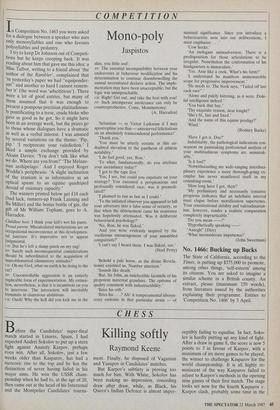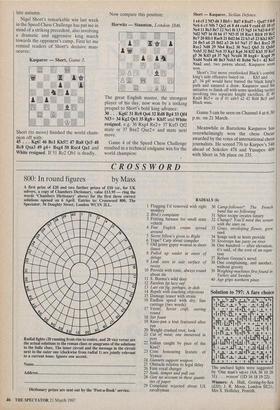CHESS
Killing softly
Raymond Keene
Before the Candidates' super-final match started in Linares, Spain, I had expected Andrei Sokolov to put up a stern fight against Anatoly Karpov, perhaps even win. After all, Sokolov, just a few weeks older than Kasparov, has had a meteoric rise to the top and he has the distinction of never having failed in his major aims. He won the USSR cham- pionship when he had to, at the age of 20, then came out at the head of his Interzonal and the Montpelier Candidates' touma- ment. Finally, he disposed of Vaganian and Yusupov in Candidates' matches.
But Karpov's subtlety is proving too much for him. With White, Sokolov has been making no impression, conceding draw after draw, while, as Black, his Queen's Indian Defence is almost imper- ceptibly failing to equalise. In fact, Soko- lov is hardly putting up any kind of fight. After a draw in game 8, the score is now 5 points to 3 in favour of Karpov, with a maximum of six more games to be played, the winner to challenge Kasparov for the world championship. It is all highly re- miniscent of the way Kasparov failed to adjust to Karpov's methods in the opening nine games of their first match. The stage looks set now for the fourth Kasparov v. Karpov clash, probably some time in the late autumn.
Nigel Short's remarkable win last week in the Speed Chess Challenge has put me in mind of a striking precedent, also involving a dramatic and aggressive king march towards the opponent's camp. First let me remind readers of Short's decisive man- oeuvre: Kasparov — Short, Game 3 Short (to move) finished the world cham- pion off with: 45 . . . Kg6! 46 Bc1 Kh5!! 47 Ra8 Qc5 48
Rc8 Qxa3 49 g4+ Bxg4 50 Rxc4 Qal and White resigned. If 51 Rc2 Qbl is deadly. Now compare this position: Horwitz — Staunton, London 1846.
The great English master, the strongest player of his day, now won by a striking prequel to Short's bold king advance: 30 . . . Kg6! 31 Rc8 Qe6 32 Rd8 Bg4 33 Qf4 Nf3+ 34 Kg2 Qel 35 RgS+ Kh5! and White resigned, e.g. 36 Rxg4 Re2+ 37 Kxf3 0f2 mate or 37 Bxe2 Qxe2+ and mate next move.
Game 4 of the Speed Chess Challenge resulted in a technical endgame win for the world champion: Short — Kasparov, Sicilian Defence.
1 e4 c5 2 Nf3 d6 3 BbS+ Bd7 4 Bxd7+ Qxd7 5 0-0 Nc6 6 c3 Nf6 7 Qe2 e6 8 d4 cxd4 9 cxd4 d5 10 e5 Ne4 11 Be3 Be7 12 Nel f613 f3 Ng5 14 Nd3 0-015 Nd2 Nf7 16 f4 b6 17 Nf3 f5 18 Racl RfcS 19 Rc2 Rc7 20 Rfcl RacS 21 Bd2 h6 22 h3 a5 23 Kh2 24 Be3 a4 25 Bd2 a3 26 b3 Na7 27 Bel Rxc2 28 Rxc2 Nd8 29 Nb4 Rxc2 30 Nxc2 Qb5 31 Qxb5 Nxb5 32 Bd2 Nc6 33 Kgl Kg6 34 Kf2 Kh5 35 Ke3 g5 36 Kd3 g4 37 Ngl Ncxd4 38 hxg4+ Kxg4 39 Nxd4 Nxd4 40 Be3 Nxb3 41 Bxb6 Ncl+ 42 Kc2 Nxa2 and, two pawns ahead, Kasparov soon won.
Short's 31st move overlooked Black's coming king's side offensive based on . . Kh5 and . . g5. 34 g4! would have barred ihe black kings path and ensured a draw. Kasparov used his initiative to finish off with some sparkling tactics involving two separate knight sacrifices. If 40 Kxd4 Bc5+ or if 41 axb3 a2 42 Bd4 Bc5 and Black wins.
Game 5 can be seen on Channel 4 at 6.30 p.m. on 21 March.
Meanwhile in Barcelona Kasparov has overwhelmingly won the chess Oscar awarded by the votes of international chess journalists. He scored 776 to Karpov's 548 ahead of Sokolov 478 and Yusupov 409 with Short in 5th place on 335.



















































 Previous page
Previous page